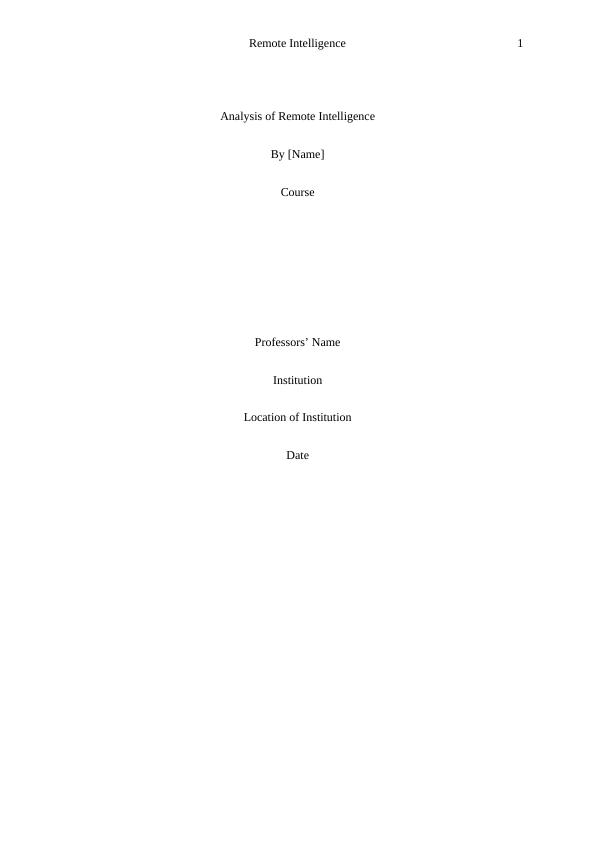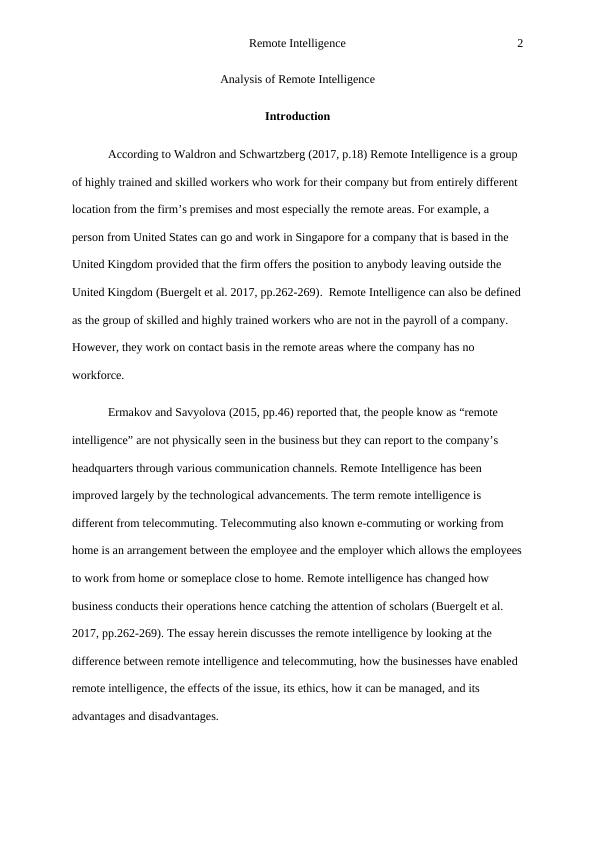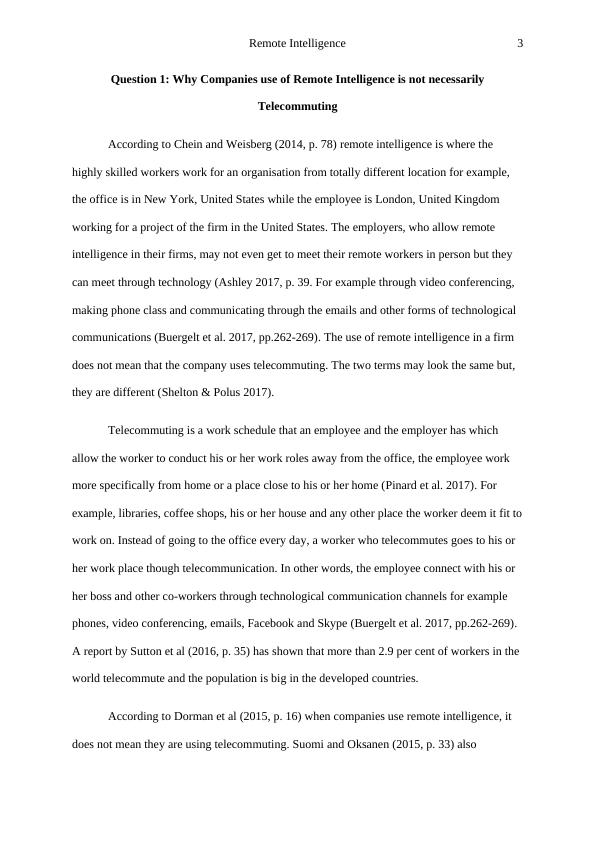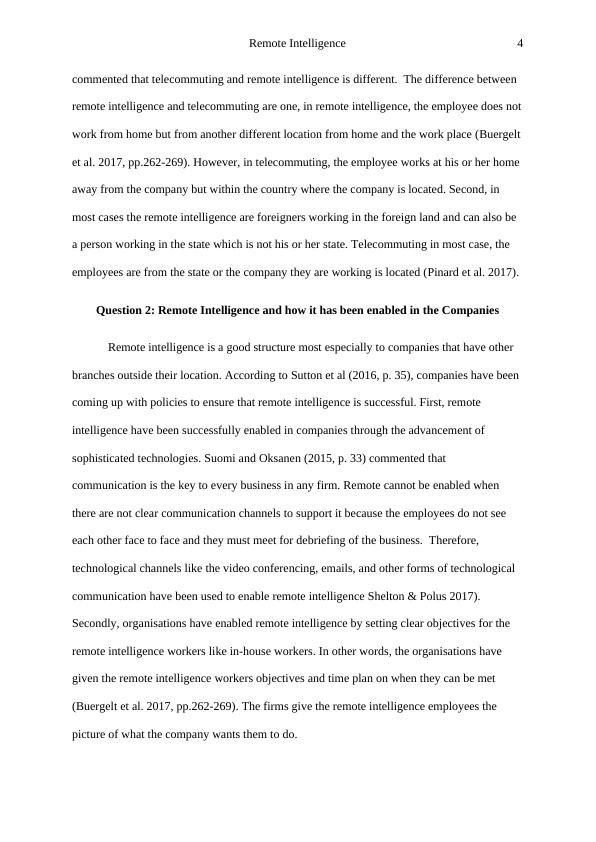Remote Intelligence: Analysis, Ethics, Benefits and Disadvantages
Added on 2023-06-11
12 Pages3551 Words292 Views
Remote Intelligence 1
Analysis of Remote Intelligence
By [Name]
Course
Professors’ Name
Institution
Location of Institution
Date
Analysis of Remote Intelligence
By [Name]
Course
Professors’ Name
Institution
Location of Institution
Date

Remote Intelligence 2
Analysis of Remote Intelligence
Introduction
According to Waldron and Schwartzberg (2017, p.18) Remote Intelligence is a group
of highly trained and skilled workers who work for their company but from entirely different
location from the firm’s premises and most especially the remote areas. For example, a
person from United States can go and work in Singapore for a company that is based in the
United Kingdom provided that the firm offers the position to anybody leaving outside the
United Kingdom (Buergelt et al. 2017, pp.262-269). Remote Intelligence can also be defined
as the group of skilled and highly trained workers who are not in the payroll of a company.
However, they work on contact basis in the remote areas where the company has no
workforce.
Ermakov and Savyolova (2015, pp.46) reported that, the people know as “remote
intelligence” are not physically seen in the business but they can report to the company’s
headquarters through various communication channels. Remote Intelligence has been
improved largely by the technological advancements. The term remote intelligence is
different from telecommuting. Telecommuting also known e-commuting or working from
home is an arrangement between the employee and the employer which allows the employees
to work from home or someplace close to home. Remote intelligence has changed how
business conducts their operations hence catching the attention of scholars (Buergelt et al.
2017, pp.262-269). The essay herein discusses the remote intelligence by looking at the
difference between remote intelligence and telecommuting, how the businesses have enabled
remote intelligence, the effects of the issue, its ethics, how it can be managed, and its
advantages and disadvantages.
Analysis of Remote Intelligence
Introduction
According to Waldron and Schwartzberg (2017, p.18) Remote Intelligence is a group
of highly trained and skilled workers who work for their company but from entirely different
location from the firm’s premises and most especially the remote areas. For example, a
person from United States can go and work in Singapore for a company that is based in the
United Kingdom provided that the firm offers the position to anybody leaving outside the
United Kingdom (Buergelt et al. 2017, pp.262-269). Remote Intelligence can also be defined
as the group of skilled and highly trained workers who are not in the payroll of a company.
However, they work on contact basis in the remote areas where the company has no
workforce.
Ermakov and Savyolova (2015, pp.46) reported that, the people know as “remote
intelligence” are not physically seen in the business but they can report to the company’s
headquarters through various communication channels. Remote Intelligence has been
improved largely by the technological advancements. The term remote intelligence is
different from telecommuting. Telecommuting also known e-commuting or working from
home is an arrangement between the employee and the employer which allows the employees
to work from home or someplace close to home. Remote intelligence has changed how
business conducts their operations hence catching the attention of scholars (Buergelt et al.
2017, pp.262-269). The essay herein discusses the remote intelligence by looking at the
difference between remote intelligence and telecommuting, how the businesses have enabled
remote intelligence, the effects of the issue, its ethics, how it can be managed, and its
advantages and disadvantages.

Remote Intelligence 3
Question 1: Why Companies use of Remote Intelligence is not necessarily
Telecommuting
According to Chein and Weisberg (2014, p. 78) remote intelligence is where the
highly skilled workers work for an organisation from totally different location for example,
the office is in New York, United States while the employee is London, United Kingdom
working for a project of the firm in the United States. The employers, who allow remote
intelligence in their firms, may not even get to meet their remote workers in person but they
can meet through technology (Ashley 2017, p. 39. For example through video conferencing,
making phone class and communicating through the emails and other forms of technological
communications (Buergelt et al. 2017, pp.262-269). The use of remote intelligence in a firm
does not mean that the company uses telecommuting. The two terms may look the same but,
they are different (Shelton & Polus 2017).
Telecommuting is a work schedule that an employee and the employer has which
allow the worker to conduct his or her work roles away from the office, the employee work
more specifically from home or a place close to his or her home (Pinard et al. 2017). For
example, libraries, coffee shops, his or her house and any other place the worker deem it fit to
work on. Instead of going to the office every day, a worker who telecommutes goes to his or
her work place though telecommunication. In other words, the employee connect with his or
her boss and other co-workers through technological communication channels for example
phones, video conferencing, emails, Facebook and Skype (Buergelt et al. 2017, pp.262-269).
A report by Sutton et al (2016, p. 35) has shown that more than 2.9 per cent of workers in the
world telecommute and the population is big in the developed countries.
According to Dorman et al (2015, p. 16) when companies use remote intelligence, it
does not mean they are using telecommuting. Suomi and Oksanen (2015, p. 33) also
Question 1: Why Companies use of Remote Intelligence is not necessarily
Telecommuting
According to Chein and Weisberg (2014, p. 78) remote intelligence is where the
highly skilled workers work for an organisation from totally different location for example,
the office is in New York, United States while the employee is London, United Kingdom
working for a project of the firm in the United States. The employers, who allow remote
intelligence in their firms, may not even get to meet their remote workers in person but they
can meet through technology (Ashley 2017, p. 39. For example through video conferencing,
making phone class and communicating through the emails and other forms of technological
communications (Buergelt et al. 2017, pp.262-269). The use of remote intelligence in a firm
does not mean that the company uses telecommuting. The two terms may look the same but,
they are different (Shelton & Polus 2017).
Telecommuting is a work schedule that an employee and the employer has which
allow the worker to conduct his or her work roles away from the office, the employee work
more specifically from home or a place close to his or her home (Pinard et al. 2017). For
example, libraries, coffee shops, his or her house and any other place the worker deem it fit to
work on. Instead of going to the office every day, a worker who telecommutes goes to his or
her work place though telecommunication. In other words, the employee connect with his or
her boss and other co-workers through technological communication channels for example
phones, video conferencing, emails, Facebook and Skype (Buergelt et al. 2017, pp.262-269).
A report by Sutton et al (2016, p. 35) has shown that more than 2.9 per cent of workers in the
world telecommute and the population is big in the developed countries.
According to Dorman et al (2015, p. 16) when companies use remote intelligence, it
does not mean they are using telecommuting. Suomi and Oksanen (2015, p. 33) also

Remote Intelligence 4
commented that telecommuting and remote intelligence is different. The difference between
remote intelligence and telecommuting are one, in remote intelligence, the employee does not
work from home but from another different location from home and the work place (Buergelt
et al. 2017, pp.262-269). However, in telecommuting, the employee works at his or her home
away from the company but within the country where the company is located. Second, in
most cases the remote intelligence are foreigners working in the foreign land and can also be
a person working in the state which is not his or her state. Telecommuting in most case, the
employees are from the state or the company they are working is located (Pinard et al. 2017).
Question 2: Remote Intelligence and how it has been enabled in the Companies
Remote intelligence is a good structure most especially to companies that have other
branches outside their location. According to Sutton et al (2016, p. 35), companies have been
coming up with policies to ensure that remote intelligence is successful. First, remote
intelligence have been successfully enabled in companies through the advancement of
sophisticated technologies. Suomi and Oksanen (2015, p. 33) commented that
communication is the key to every business in any firm. Remote cannot be enabled when
there are not clear communication channels to support it because the employees do not see
each other face to face and they must meet for debriefing of the business. Therefore,
technological channels like the video conferencing, emails, and other forms of technological
communication have been used to enable remote intelligence Shelton & Polus 2017).
Secondly, organisations have enabled remote intelligence by setting clear objectives for the
remote intelligence workers like in-house workers. In other words, the organisations have
given the remote intelligence workers objectives and time plan on when they can be met
(Buergelt et al. 2017, pp.262-269). The firms give the remote intelligence employees the
picture of what the company wants them to do.
commented that telecommuting and remote intelligence is different. The difference between
remote intelligence and telecommuting are one, in remote intelligence, the employee does not
work from home but from another different location from home and the work place (Buergelt
et al. 2017, pp.262-269). However, in telecommuting, the employee works at his or her home
away from the company but within the country where the company is located. Second, in
most cases the remote intelligence are foreigners working in the foreign land and can also be
a person working in the state which is not his or her state. Telecommuting in most case, the
employees are from the state or the company they are working is located (Pinard et al. 2017).
Question 2: Remote Intelligence and how it has been enabled in the Companies
Remote intelligence is a good structure most especially to companies that have other
branches outside their location. According to Sutton et al (2016, p. 35), companies have been
coming up with policies to ensure that remote intelligence is successful. First, remote
intelligence have been successfully enabled in companies through the advancement of
sophisticated technologies. Suomi and Oksanen (2015, p. 33) commented that
communication is the key to every business in any firm. Remote cannot be enabled when
there are not clear communication channels to support it because the employees do not see
each other face to face and they must meet for debriefing of the business. Therefore,
technological channels like the video conferencing, emails, and other forms of technological
communication have been used to enable remote intelligence Shelton & Polus 2017).
Secondly, organisations have enabled remote intelligence by setting clear objectives for the
remote intelligence workers like in-house workers. In other words, the organisations have
given the remote intelligence workers objectives and time plan on when they can be met
(Buergelt et al. 2017, pp.262-269). The firms give the remote intelligence employees the
picture of what the company wants them to do.

End of preview
Want to access all the pages? Upload your documents or become a member.
Related Documents
Remote Intelligence: Rise of Telecommuting and its Impact on Organizationslg...
|14
|3501
|470
Remote Intelligence and Telecommuting: A Comparative Analysislg...
|15
|3992
|216
Telecommuting and Remote Intelligencelg...
|12
|3305
|346
Rising Area of Remote Intelligence in Marketing & Managementlg...
|10
|2233
|457
Remote Intelligence: Understanding, Nature, Ethics, Benefits and Disadvantageslg...
|11
|3701
|219
Concept of Telecommuting | Reportlg...
|13
|3521
|18
